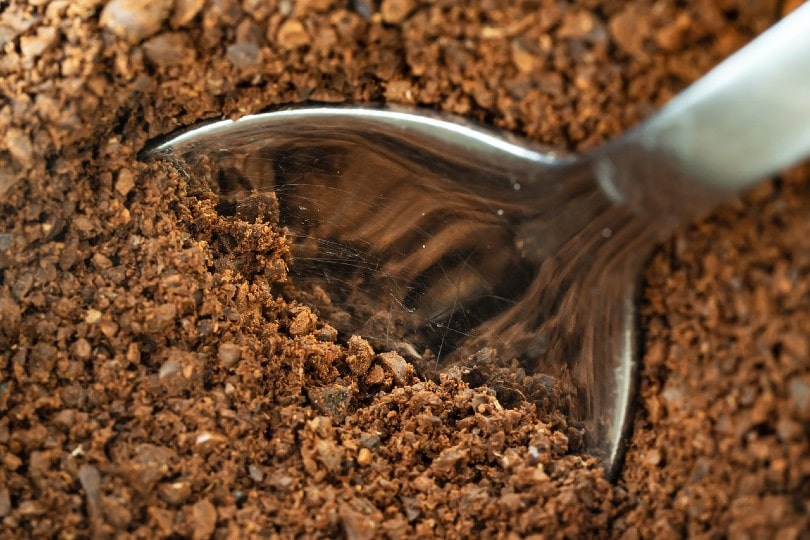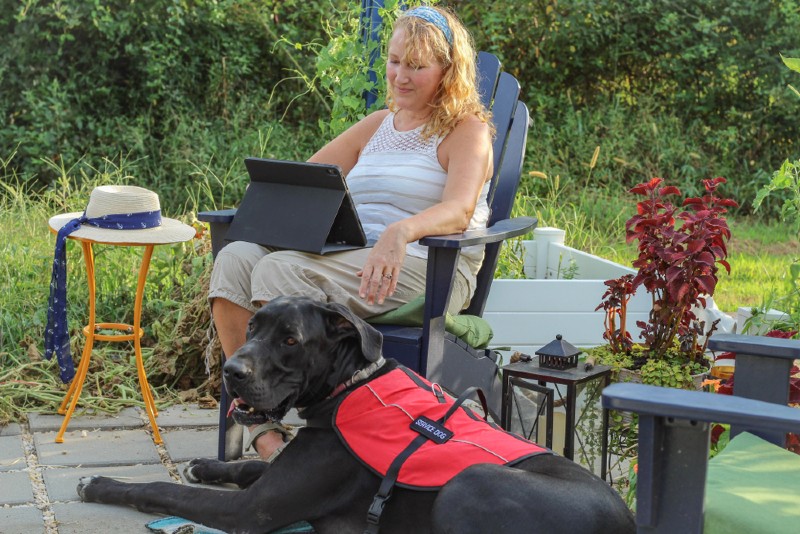Why Do German Shepherds Dig Holes? 6 Likely Reasons & How to Stop It

Updated on
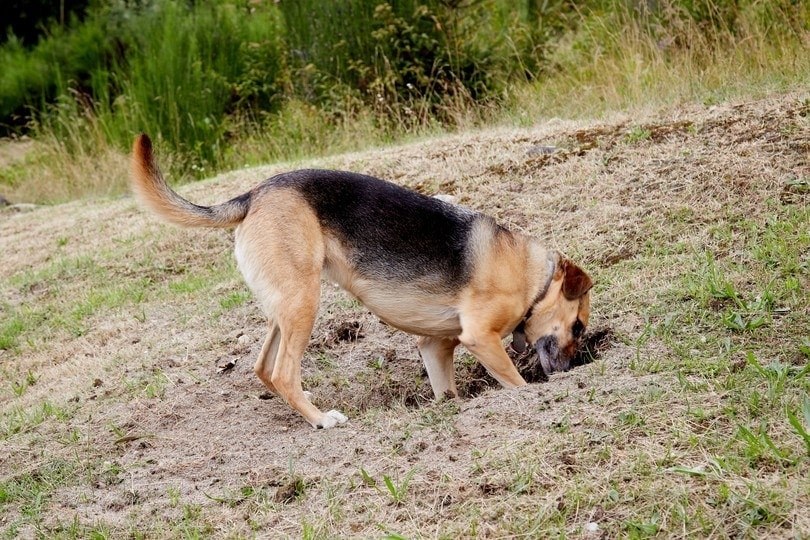
Anyone who’s been around a German Shepherd knows that they are a high-energy breed. If your German Shepherd is prone to digging, you might wonder what you can do to curb that behavior. After all, after a while, it can leave your yard looking pretty shabby.
Also, if you’re trying to keep them in an enclosed area, digging could make that pretty difficult. If you want to put an end to your dog ripping up your flowers or destroying your yard, you came to the right place. Let’s discuss some reasons why your German shepherd might be digging holes and how you can fix that.
The 6 Reasons Why German Shepherds Dig
1. Temperature Control
It could be that your dog is either too hot or too cold and is looking for temperature control in creating a hole. The ground is neutral compared to the outside air, providing an excellent environment to regulate body temperature.
Because your German Shepherd has a thick, double coat, they might be looking for creative ways to keep their cool. If you notice that they seem overheated, they may try to lay in the hole they dig to create their own natural air conditioning system.
Getting them a kiddy pool or other means of self-cooling can divert their attention from digging outdoors. Otherwise, you can also monitor and limit their outdoor adventures, so they don’t have the time to start.
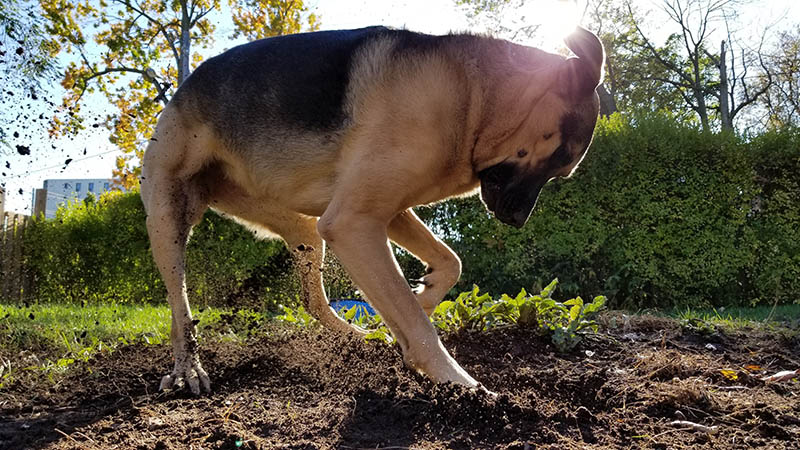
2. Searching for Prey
Naturally, German Shepherds have a high prey drive and are very instinctual about this. If your dog smells a mole or other underground rodent, they might be trying to find whatever that smell is. If they’re trying to dig their way to seek out potential prey, it could really be destructive.
That is especially true since many underground rodents and animals gravitate toward flower and vegetable gardens that serve as food sources. If your German Shepherd is digging up your azaleas or destroying your tomato plants, it might not be their fault.
In any situation, it’s best to keep your GSD separate from your gardens—when possible. Also, discourage digging by deterring unwanted yard guests in the first place. You can add sprays, organic recipes, and other DIY repellents to your gardens as well.
You could also search for options to fence in these sensitive areas, protecting them from your dog and other animals as well.
3. Escaping
Of course, one of the classic reasons why your dog might be digging holes is to escape an enclosure. If they are fenced-in and sense freedom on the other side, they can very well attempt to dig their way through. It’s imperative with breeds like this to have an extremely secure outdoor area.
If your dog starts digging, you’re going to need to put proper reinforcements up to prevent escapes. A dog that gets loose can be very dangerous. Not only can they put themselves in harm’s way, but they might also wind up in a shelter or lost with no way to return home.
An escaped German Shepherd could spark fear into some people since they are a larger breed, especially if your dog is more aggressive. Preventing escape is essential, but also make sure their dog tags and microchipping information are up to date, just in case.

4. Hiding Food
If your dog has a possession to stash, it is really common for them to dig and bury it. Wild dogs use this method to hide food to eat later, so they constantly have a source of nutrition.
Today, it is still a deeply embedded impulse in their brain, although they might do it for different reasons now. In any form, it is a way to save something for later, from toys to their doggy biscuit.
You could make a little designated spot to stash their keepsakes, as they will generally gravitate towards the same area every time.
5. Separation Anxiety
If your dog has separation anxiety, digging can be prevalent, especially if they are not around their owner. When a dog feels that much stress on the inside, it can come out in all sorts of negative ways, including excessive chewing and other destructive tendencies.
If the separation anxiety is bad enough, you might want to speak with your vet for solutions. Many times, owners also give their dogs stress-reducing supplements to relax them while away from home.
If the anxiety is too severe, your vet may recommend prescription-strength medication.

6. Pent-Up Energy
If your German Shepherd has excessive pent-up energy, it’s vital to properly exercise and stimulate your German Shepherd’s mind to prevent unwanted behaviors. These dogs require at least 60 minutes or more of strenuous exercise per day to stay happy and healthy.
They also need to have that brain working correctly. So, offer them lots of options to keep them busy. The more you let them burn off their steam, the less destructive they will be.
 Professional Training
Professional Training
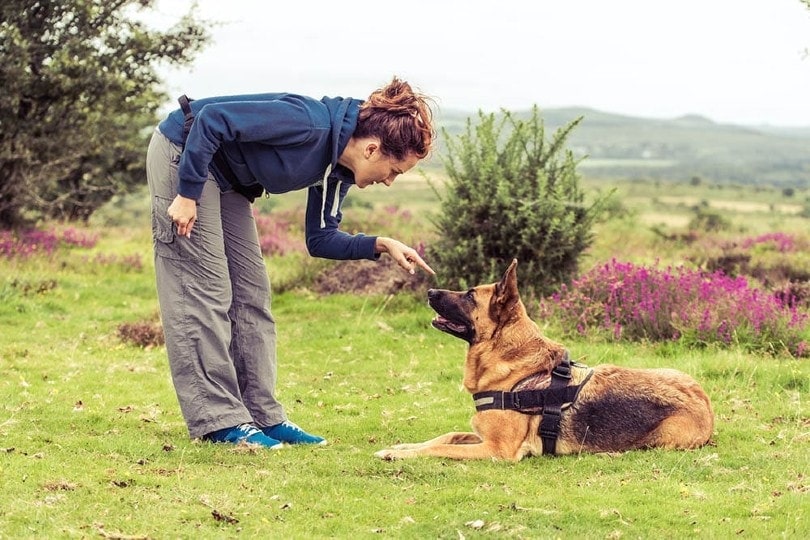
If you think your dog needs to channel their energy to prevent unwanted behaviors—or just to listen better—professional training is always welcomed.
A professional has the skills necessary to curb natural impulses, teaching your dog self-control. Once they learn how to channel their energy, they will be much more obedient.
Don’t think you’re off the hook. Many trainers will tell you that your participation is just as vital to success as your German Shepherds.
Professional training can be pricey, so you have to make sure you find a trainer within your budget. However, always make sure to read testimonials to make sure your investment is worthwhile.
Conclusion
Your German shepherd’s digging habits can have many potential causes, but that doesn’t mean you have to deal with it forever. Remember that digging is a natural impulse for dogs, so you should encourage the behavior in its place and reward accordingly.
If you think you can manage at home, try to divert the attention away from common digging spots. If you think that maybe your dog would benefit from professional training, it might fast-track positive habit.
See also:
- 10 Best Dog Beds for German Shepherds – Reviews & Top Picks
- German Pointeraner: Info, Pictures, Characteristics & Facts
Featured Image Credit: Fra tta, Shutterstock

 Professional Training
Professional Training